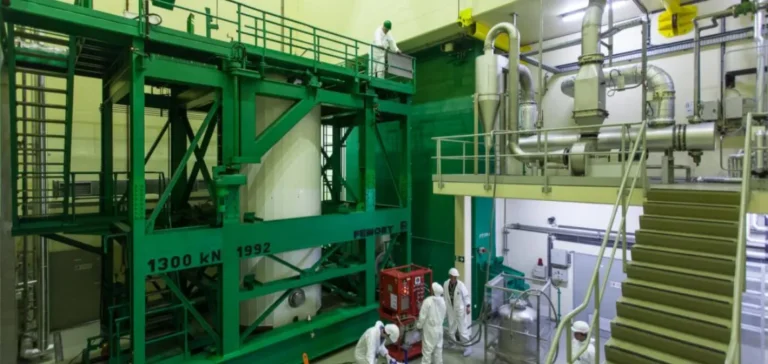Belgoprocess, the company responsible for managing radioactive waste in Belgium, has obtained a permit to build and operate a new storage structure at the Dessel site. The facility, described as an extension of the existing building 136X, will host waste produced during the final shutdown and dismantling of the country’s nuclear power plants. The permit was granted by Royal Decree on 29 August and published in the Belgian Official Gazette on 26 September, with no objections raised during the public consultation held earlier this year.
Temporary storage under secure conditions
According to the Federal Agency for Nuclear Control (FANC), the waste will be stored in thick-walled, armoured containers pending a final disposal solution. The new building, measuring 64.5 metres long, 19.5 metres wide and 12.4 metres high, will be able to accommodate up to 397 storage packages, with additional space for several dozen type 2001 transport containers containing operational test samples (EOP).
The stored waste will remain non-immobilised, keeping open all future treatment and conditioning options. This flexibility is part of Belgium’s ongoing nuclear phase-out strategy, which involves managing residues from the seven reactors that have been shut down or are in the process of closure.
Nuclear reactor closures continue
The shutdown of Belgian reactors is governed by the federal law of 31 January 2003, which mandates the gradual nuclear phase-out. Doel 1, initially scheduled to close in February 2015, had its operation extended for ten years before finally being shut down earlier this year. Doel 3 ceased operations in September 2022, followed by Tihange 2 in January 2023. Tihange 1 was shut down last week, and Doel 2 is scheduled to close in November.
The waste originates from the Doel and Tihange nuclear plants, as well as from medical, industrial and research activities. Belgium distinguishes between high-level waste, produced by electricity generation, and low- to intermediate-level waste from the use of radioactive sources.
An infrastructure built to last
The Dessel project forms part of Belgium’s long-term centralised radioactive waste management policy, without prejudging the timeline for a permanent geological disposal site. The facility’s expansion aims to accommodate the expected increase in waste volumes linked to decommissioning while meeting the safety standards required by regulatory authorities.
“The size and configuration of the new hall enable optimised management of conditioning without limiting future options,” stated the Federal Agency for Nuclear Control in its technical report.






















